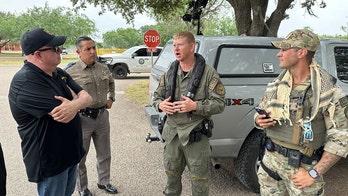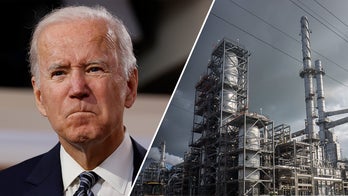Fires in the Gulf of Mexico at two offshore oil facilities in less than five months has spurred environmental groups and some lawmakers to pressure the Obama administration to extend its six-month ban on deepwater drilling.
Thursday's fire at the Mariner Energy platform 100 miles south of Louisiana came on the heels of the massive BP oil spill sparked by an explosion at the Deepwater Horizon rig -- and as the Obama administration appeared ready to lift the unpopular drilling ban.
"How many accidents are needed and how much environmental and economic damage must we suffer before we act to contain and control the source of the danger: offshore drilling?" said Rep. Frank Pallone, a New Jersey Democrat.
Mike Gravitz, oceans advocate for Environment America, said President Obama "should need no further wake-up call to permanently ban new drilling."
But others say that the latest fire is no cause for concern -- and may even support arguments against the ban.
Charlotte Randolph, president of the Lafourche, La., Parish and an outspoken critic of the moratorium, said the outcome of Thursday's platform fire proved that the oil and gas industry has effective safety procedures.
"The people were safely recovered. The oil did not spill. It's everything the Deepwater Horizon was not," she said.
The current drilling ban, which doesn't apply to oil platforms like the one affected by Thursday's fire, has halted drilling at 33 ocean wells, but there still are more than 7,300 active leases in the Gulf of Mexico, 58 percent of them in deep waters, according to the American Petroleum Institute.
There are about 3,400 platforms operating in the Gulf, pumping about a third of America's domestic oil.
Platforms are vastly different from oil rigs like BP's Deepwater Horizon. They are usually brought in after wells are already drilled and sealed and the oil is flowing at a predictable pressure. A majority of platforms in the Gulf do not require crews on board.
The initial reports of Thursday's platform fire triggered a collective panic, but unlike the April explosion of the Deepwater Horizon rig -- which killed 11 people and led to the largest offshore oil spill in the nation's history -- this fire killed no one and sent no crude gushing into the water.
The latest fire "is another reminder that drilling accidents happen all too frequently. We cannot afford to lose any more human lives, nor can we tolerate further damage to the Gulf and its irreplaceable ocean ecosystems," said Jacqueline Savitz of the environmental group Oceana.
Rep. Edward Markey, D-Mass., a leading critic of BP, said the fire highlights the risks associated with offshore drilling. Lawmakers "have a duty to ... all oil workers to make sure the oil industry's drilling practices are safe and sound," Markey said.
The Interior Department has said it is considering lifting the ban for certain categories of rigs before the scheduled Nov. 30 expiration. But after Thursday's accident the department may hesitate to act.
White House press secretary Robert Gibbs said he didn't think the incident would affect the drilling moratorium. Gibbs resisted any effort to link the platform fire to the BP spill.
"At this point, based on what we know, I don't want to marry those two up," Gibbs told reporters Thursday.
A spokeswoman for Interior Secretary Ken Salazar declined to comment.
Industry representatives also distinguished between the two incidents, saying that the fire did not involve drilling and occurred on a production platform where wells have already been drilled and sealed, rather than a drilling rig like the Deepwater Horizon.
Mariner Energy said there were seven active production wells on its platform, but they were shut down for maintenance shortly before the fire broke out. A crew was on the platform painting and sandblasting when the fire occurred, a company spokesman said Friday.
Lee Hunt, chief executive of the International Association of Drilling Contractors, said those urging tighter restrictions on offshore drilling were overreacting.
"These things have happened and been reported before" and generated little media attention, Hunt said.
Still, Hunt conceded that the timing of the fire was "not fortuitous," adding that he expects upcoming congressional hearings on the Mariner fire to be a "minor circus."
Hunt called the fire a "major blast" similar to one at a land-based refinery.
"As a geographical workplace, you would expect some fires. Just like you'd expect some chemical storage facilities ... will occasionally have three-alarm fires on land," he said. "They do happen."
Federal authorities have cited Mariner Energy and related entities for 10 accidents in the Gulf of Mexico over the past four years, according to safety records from the Bureau of Ocean Energy Management, Regulation and Enforcement. The accidents range from platform fires to pollution spills and a blowout.
A day before the fire, the American Petroleum Institute held a "Rally for Jobs" in Houston to protest the drilling moratorium. Mariner official Barbara Dianne Hagood was among those in attendance, according to a Financial Times report.
"I have been in the oil and gas industry for 40 years, and this administration is trying to break us," she told the London-based paper. "The moratorium they imposed is going to be a financial disaster for the Gulf Coast, Gulf Coast employees and Gulf Coast residents."
The Associated Press contributed to this report.




